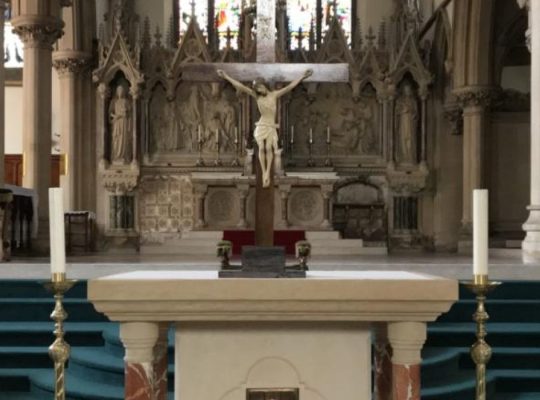Homily. Fourth Sunday of Ordinary Time Year B.
After recording the call of the first four ‘fishers of men,’ Mark shows how Jesus, accompanied by his disciples, exercised his ministry. In order to explain and illustrate the object and the style of this activity, the evangelist presents the activities of one day, the first, in Capernaum. On the sabbath in the synagogue, Jesus teaches and afterwards frees a man from an unclean spirit that is tormenting him.
Following the example of the Old Testament, Christian tradition gives a very important place to Moses. Moses remains the prophet par excellence, the man chosen among all to transmit to the people, God’s words and law, with an authority received from above. Any prophet whom God will raise up after him will have a similar mission and must be similarly listened to. This is the message of the First Reading of this Sunday, chosen because the Gospel reading speaks of the ‘new teaching with authority.’
After Moses, God will address people through the intermediary of humans. ‘I will raise up for them a prophet like you from among their kinsmen, and will put my words into his mouth; he shall teach them all that I command him.’ This statement expresses the originality of biblical prophets, compared with that known throughout the ancient Middle East, in Egypt, and in the neighbouring regions.The initiative comes from God. Prophets do not claim to unveil God’s secrets or his intentions. What they know and what they say comes from God. They have received the order of transmitting God’s words, and they cannot shirk this mission, whatever the cost. Such is Moses; such are all true prophets: servants of God and his word. By tracing prophets to Moses—one of the most characteristic institutions among the people of the bible—this passage of Deuteronomy gives us a sure criterion for recognizing the true spokesperson of God. At the same time, it promises that God will never abandon his own but will always remain present among them and will continue to make his will known to them. However, the lineage of the great prophets was interrupted: ‘Deeds on our behalf we do not see; there is no prophet now, and no one of us knows how long……’ (Ps 74:9) This lament attests to the vigorous hope of seeing a prophet arise one day. Was this not what Moses announced? Was he not speaking of another than himself? Hence, what people said concerning Elijah’s return, which would precede the Messiah, the question put to John the Baptist, and the question concerning Jesus.
The Christian re-reading of Deuteronomy is explicit. Jesus, the Christ, is the prophet announced, the new Moses, greater than the original Moses. This interpretation, going beyond the letter of Deuteronomy, expresses Christian faith. Jesus is the Father’s emissary, who knows God’s secrets because he comes from him and reveals him. He is the prophet who, with an unheard-of authority interprets the Law by fulfilling it. Moses reported God’s words; Jesus proclaims: ‘You have heard how it was said….but I say to you….’ We can neither add to nor subtract from decisive words transmitted to us by the apostles’ ‘preaching. Before leaving his own, Jesus declares: ‘The Advocate, the Holy Spirit that the Father will send in my name—he will teach you everything and remind you of all that [I] told you.’ The Spirit has been given to the Church that it might better understand the Lord’s teaching and unfold the meaning of his words according to the sign of the times. ‘To believe in the relevance of God is to believe in the presence of the prophets among us who show us the relevance of his word. To believe in the faithfulness of God and in his Church is to believe that he will not let it fall asleep, be overwhelmed, lose its vigour and the dynamism of its hope, and for that reason, Jesus Christ, ‘the’ Prophet, is present through the intermediary of men and women prophets who, in their individual ways, in their places and times, actualize the Word that invigorates all those who believe in him.’
‘This is the time of fulfilment. The kingdom of God is at hand. Repent and believe in the Gospel.’ Such is, according to Mark, the fundamental content of the message proclaimed by Jesus as soon as he begins to preach in Galilee. After this ‘summary,’ which expresses in a nutshell Jesus’ mission and ministry, Mark continues by showing how Jesus manifests that he is the messenger of the good news, or rather, that he himself is the Good News. Mark, as we notice throughout his Gospel, always proceeds in a concrete manner. His account is a succession of scenes, of tableaux traced with a few firm lines without the slightest unessential addition. We have here a sophisticated literary technique, apparently very simple but masterfully used. Besides, it is an effective pedagogical device. For the readers find themselves not simply spectators but personally involved in what is happening; they receive the Lord’s words at their full force; they cannot help but take sides in the discussions and controversies. Thus Mark draws us to accompany Jesus; to enter the synagogue at Capernaum with him on the sabbath, and follow him during the first day of his ministry, whose beginning today’s Gospel reports.
With his disciples—Peter and Andrew, James and John—Jesus, faithful to the Law, goes to the synagogue, where the gathering of the community furnishes him with the opportunity for public speaking and teaching. The presentation of Jesus’ first manifestation contains some important lessons to keep in mind. First of all, the good news is placed within the continuity of Jewish tradition; Jesus’ word comes, officially we might say, as a prolongation of God’s word set down in the Law and proclaimed by the prophets. But, as Mark insistently notes, Jesus teaches ‘as one having authority and not as scribes.’ Mark does not offer any comment. He simply relates the fact, which arouses astonishment in everyone. In this, he prompts us to ask ourselves how we in turn receive this teaching. That great interpreter of Holy Scripture, Saint Jerome accepted it thus:
‘He was not saying, ‘the Lord says this,’ or ‘He who sent me says that’; he spoke in his own name, he who first of all had spoken through the prophets. There is a nuance of difference between the expressions ‘it is written’ and ‘The Lord says this’; but there is a further difference in saying ‘In truth I say to you.’ See, for instance, ‘You have heard how it was said ‘you shall not kill’….. ‘you shall not commit adultery’. For whom was this written? For Moses, in God’s commands. If this was written by God’s hand, how dare you say—you—‘But I say to you…..’ Since you are not the first to have formulated the law? No one has the power to change the law, except the king himself. But is it the Father or the Son who promulgated this law? Answer, you heretic. Whatever your intentions, I am pleased to retort: for me, it is the same thing! If the Father has given this Law, it is he who also altars it. Now the Son is equal to him, he who changes what the other ordained. Whether it is he who gave the Law or transformed it, an equal authority is necessary to promulgate and modify; no one may do this except the king.
Th people were astonished at his teaching. What new teaching had he given? What unheard-of thing did he say? He was saying, he personally, what he had previously said through the prophets. And they were astonished because his teaching gave them the impression that he possessed the authority, contrary to the scribes. He was not speaking as a master but as Lord. His statements did not appeal to a higher authority; he was speaking in his own name. Furthermore, he himself declared that he who was speaking to them now was the same who had spoken through the prophets…… ‘It is I who have foretold it. Here I am.’’
Mark adds to this presentation of Jesus speaking with authority the account of an exorcism, rather strange in some respects. Whereas the crowd heard this teaching with admiration, ‘an unclean spirit’ violently confronts the preacher: ‘What do you want with us Jesus of Nazareth? Have you come to destroy us? I know who you are : the Holy One of God.’ Usually, the sick or their relatives are the ones to cry their distress to Jesus, whose divine power they recognise and whose mystery, they more or less perceive. Now in Mark’s Gospel the first one to publicly acknowledge Jesus’ divine origin is a demon. In spite of the perfect accuracy of the declaration, we must not see it as a profession of faith that a sort of evidence would wrench out, against its will from the ‘unclean spirit.’ Faith entails worship, praise and thanksgiving. But we have here a cry of rage and despair. What is the interpretation of this disconcerting scene? Mark wants to bring the readers beyond the astonishment provoked by the event to the understanding of what is at stake in the Lord’s coming. The Spirit drove the Lord into the desert, where he remained for forty days, tempted by Satan, witnessed only by the wild beasts and the angels who ministered to him. Here, Mark wants to show that the proclamation of the good news is the beginning of the overt, public, and decisive struggle between Jesus and Satan. ‘I know who you are.’ This is of no advantage to the unclean spirit. On the contrary, it sees itself unmasked and at the same time, lost in advance. As for Jesus he yet unknown. ‘What is this?’ However, thanks to his teaching and actions, he will progressively be recognized as the emissary, as Son of God. His identity will clearly appear to believers’ eyes when he is on the cross. For only at that moment will the affirmation ‘Jesus is the Son of God’ be the expression of authentic faith. Unless we accept the cross, we cannot claim to fully and truthfully know who Jesus is.
At Capernaum, Jesus demonstrates a striking authority over Satan: ‘Quite, come out of him!’ He will speak in a similar manner to the raging sea, a symbol of the evil forces he has come to vanquish: ‘Quite! Be still!’ In both cases the bystanders’ reactions are identical: ‘What is this?….. He commands even the unclean spirits and they obey him.’ ‘Who then is this whom even the wind and the sea obey?’ Mark leaves us with a grave question; it is up to each one of us to give an answer. In order to know the Lord, we must assiduously follow him, day after day, up to the cross on which the Son of God has conquered all forces of evil. And pray that our hearts do not harden or that we become complacent.
‘O that today you would listen to his voice! Harden not your hearts.’


